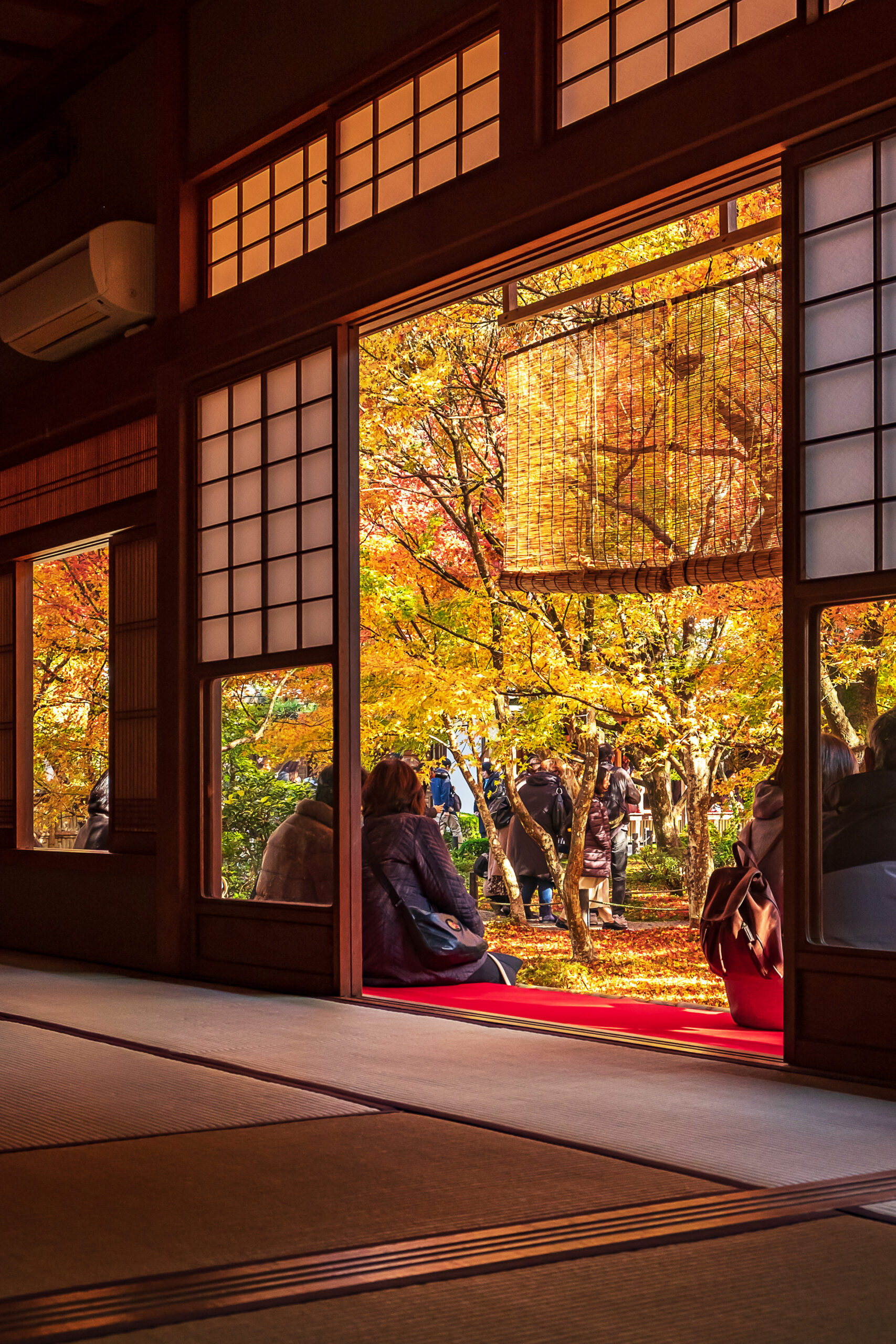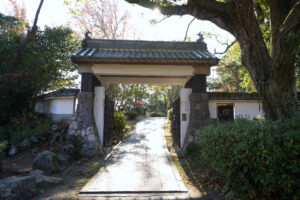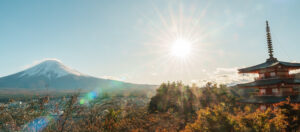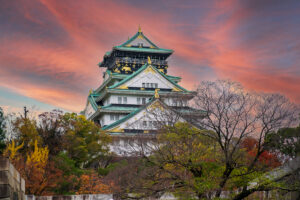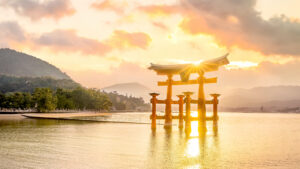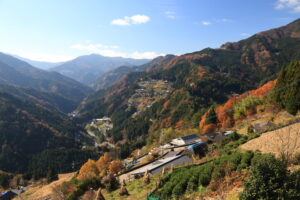Nestled in the magnificent city of Kyoto, Enkoji Temple stands as a serene testament to the principles of Zen Buddhism. Known for its tranquil atmosphere and striking natural beauty, this hidden gem offers visitors a unique glimpse into the spiritual and cultural heritage of Japan. With its breathtaking gardens, rich history, and architectural elegance, Enkoji Temple is more than just a place of worship; it is a sanctuary for the soul.
Discovering Enkoji Temple: A Hidden Gem in Kyoto
Tucked away in the northern district of Kyoto, Enkoji Temple often goes unnoticed by the throngs of tourists flocking to more famous sites. This quiet temple, surrounded by lush greenery and serene landscapes, offers a peaceful respite from the bustling city. Visitors who venture off the beaten path will find themselves immersed in a tranquil environment that invites introspection and mindfulness.
The entrance to Enkoji is marked by a simple yet impressive gate that sets the tone for what lies beyond. As guests step through this threshold, they are greeted by a stunning array of seasonal flora and meticulously maintained gardens. The air is filled with the soothing sounds of nature, enhancing the temple’s reputation as a calming oasis in the heart of Kyoto.
As one explores the hidden pathways and tranquil nooks of Enkoji, the sense of peace becomes palpable. The temple is not merely a destination but an experience—one that encourages visitors to slow down, breathe deeply, and appreciate the beauty that surrounds them. Enkoji serves as a reminder of the importance of inner stillness, making it a perfect retreat for those seeking solace away from the fast pace of modern life.
The close-knit community of locals who cherish Enkoji adds to its charm. These residents often visit the temple for quiet contemplation or to participate in community events, reinforcing the temple’s role as a social and spiritual hub. Their respect and dedication to Enkoji further enhance its reputation as a hidden gem, waiting to be discovered.
In a world that often prioritizes speed and convenience, Enkoji Temple stands as a gentle reminder of the beauty of stillness. Its ability to foster connection with nature and self makes it an invaluable destination for both locals and travelers seeking a deeper understanding of Zen principles.
Overall, Enkoji Temple’s hidden location and serene ambiance make it a must-visit for anyone looking to explore the quieter, more reflective side of Kyoto.
The History of Enkoji Temple: A Journey Through Time
Enkoji Temple’s roots can be traced back to the 17th century, a time when it was established by the renowned Zen master, Takuan Sōhō. Takuan, a prominent figure in the Rinzai sect of Zen Buddhism, sought to create a space for meditation and spiritual growth, laying the foundation for what would become Enkoji Temple. His vision was to develop a site where individuals could step away from the chaos of everyday life and delve into the depths of Zen philosophy.
Over the years, Enkoji has undergone various transformations, reflecting the changing tides of Japanese history. The temple’s initial structures were modest, primarily serving as a place for meditation. However, as the popularity of Zen Buddhism increased, so did the need for more expansive facilities. The temple expanded its grounds, adding new buildings and gardens that enhanced its spiritual atmosphere.
During Japan’s tumultuous periods, including the Edo period, Enkoji became a refuge for those seeking enlightenment and solace from societal upheaval. It played a critical role in preserving Zen teachings and practices during challenging times, establishing itself as a cornerstone in Kyoto’s spiritual landscape. Its rich history resonates with the teachings of Takuan, who emphasized the importance of mindfulness and inner peace.
The temple survived the ravages of World War II, though many of its original structures were lost. However, efforts were made to restore and preserve Enkoji, ensuring that its legacy would continue for future generations. Today, visitors can observe the careful restorations that honor the temple’s historical significance while integrating modern elements of functionality and comfort.
As one walks through Enkoji’s tranquil grounds, it becomes evident that the temple is not merely a historical site but an evolving sanctuary that continues to adapt to the needs of its visitors. The echoes of its storied past linger in the air, inviting pilgrims and tourists alike to connect with the centuries of wisdom that flow through its corridors.
The history of Enkoji Temple is a testament to the enduring power of Zen philosophy—one that encourages continuous growth, reflection, and connection with the world around us.
Architectural Wonders: Exploring Enkoji’s Design
Enkoji Temple’s architectural design is a harmonious blend of traditional Japanese aesthetics and Zen principles. The layout of the temple reflects the importance of nature in Zen philosophy, with structures intentionally placed to create a seamless connection between the man-made and the natural. The simple yet elegant buildings are designed to foster contemplation and tranquility, embodying the essence of Zen architecture.
One of the most striking features of Enkoji is its main hall, or Hōjō, which serves as the temple’s heart. This space is characterized by its tatami mat flooring and sliding doors that open directly onto the gardens, allowing natural light to flood the interior. The minimalist design creates an atmosphere of calm and invites visitors to engage in quiet reflection.
The temple’s gardens are equally impressive, with carefully arranged rocks, ponds, and flora that enhance the overall aesthetic. The design of these gardens follows the principles of karesansui, or dry landscape gardening, which emphasizes simplicity and the beauty of natural materials. Each element is thoughtfully placed, encouraging a sense of balance and harmony that is central to Zen practices.
Visitors can also observe the temple’s various sub-temples, each with its unique architectural style and purpose. These structures often feature intricate details, such as wooden carvings and delicate shoji screens, which exemplify traditional Japanese craftsmanship. The dedication to preserving these elements speaks to the cultural significance of Enkoji within Kyoto’s architectural heritage.
The interplay of light and shadow throughout the temple complex enhances the meditative experience, inviting visitors to pause and appreciate their surroundings. The architectural design of Enkoji Temple serves as a canvas for the changing seasons, with each time of year bringing a new perspective to its beauty.
In conclusion, Enkoji Temple’s architectural wonders are not only a visual delight but also a reflection of the profound principles of Zen Buddhism. Its structures and gardens work in unison to create a serene environment that fosters mindfulness and spiritual growth.
The Serene Gardens of Enkoji: Nature’s Masterpiece
The gardens of Enkoji Temple are a testament to the beauty of nature and the artistry of Japanese landscaping. Spanning several acres, these meticulously designed gardens provide a tranquil retreat for visitors, inviting them to immerse themselves in the sights and sounds of the natural world. Each garden area offers a unique experience, showcasing the diverse flora and fauna that flourish in Kyoto’s temperate climate.
One of the most celebrated features of Enkoji’s gardens is its stunning collection of maple trees, which draw visitors from near and far, especially during the autumn months. As the leaves change colors, the landscape transforms into a vivid tapestry of reds, oranges, and yellows. This seasonal spectacle not only captivates the eyes but also evokes a sense of impermanence—a central theme in Zen philosophy.
The temple’s rock gardens are another highlight, illustrating the concept of wabi-sabi, which embraces the beauty of imperfection and transience. These carefully arranged stones create a sense of simplicity and tranquility, encouraging visitors to pause and reflect. The stillness of the rock gardens embodies the essence of Zen, fostering a deeper connection to the present moment.
The gardens also feature several koi ponds, where colorful fish glide gracefully beneath the surface. The gentle ripples of water contribute to the calming ambiance, creating a perfect backdrop for meditation and contemplation. Visitors often find themselves drawn to these serene spaces, where time seems to stand still, allowing for moments of introspection and peace.
In addition to its aesthetic beauty, the gardens of Enkoji Temple play a crucial role in promoting biodiversity. The careful cultivation of various plant species creates habitats that support local wildlife, enhancing the temple’s role as a sanctuary for nature. This commitment to ecological preservation aligns perfectly with the principles of Zen Buddhism, which emphasize the importance of living in harmony with the environment.
The serene gardens of Enkoji Temple are not merely a feast for the eyes; they are a testament to the art of landscaping and the deep spiritual connection between nature and Zen philosophy. Visitors who take the time to explore these gardens will find themselves enriched by the experience, leaving with a renewed sense of peace and gratitude.
Zen Practices at Enkoji: Embracing Mindfulness
At the core of Enkoji Temple’s philosophy lies the practice of Zen, which emphasizes mindfulness and self-awareness. The temple serves as a training ground for those seeking to deepen their understanding of Zen teachings through meditation and various rituals. Visitors are encouraged to engage with these practices, fostering a sense of inner peace and connection with the world around them.
Daily meditation sessions are held in the main hall, where participants gather to practice zazen, or seated meditation. These sessions provide an opportunity for individuals to quiet their minds, focus on their breath, and cultivate a sense of presence. The communal nature of zazen enhances the experience, as participants share in the collective energy of mindfulness.
Enkoji also offers workshops and retreats, catering to individuals at all levels of experience with Zen practices. These programs often include teachings on mindfulness, breath awareness, and the art of living in the moment. Instructors guide participants through various techniques designed to enhance self-awareness and promote emotional well-being, making Zen accessible to all.
The temple’s tranquil environment is ideal for deepening one’s meditation practice. The gentle sounds of nature, combined with the serene landscapes, create a nurturing space for reflection and contemplation. Visitors often remark on the profound sense of stillness that permeates the grounds, allowing them to connect more deeply with their inner selves.
Additionally, Enkoji promotes the importance of mindful living beyond the meditation hall. Visitors are encouraged to embrace the principles of Zen in their daily lives, fostering a sense of gratitude and presence in each moment. This holistic approach to mindfulness resonates with those seeking a more meaningful and intentional way of living.
Through its various Zen practices, Enkoji Temple offers a path to self-discovery and spiritual growth. Whether one participates in meditation sessions or simply walks through the gardens in contemplation, the temple provides a rich tapestry of experiences that invite individuals to embrace mindfulness and cultivate a deeper connection with themselves and the world.
Seasonal Beauty: Enkoji Temple Through the Year
One of the unique aspects of Enkoji Temple is its breathtaking transformation throughout the seasons. Each time of year offers a different visual spectacle, inviting visitors to experience the beauty of nature in its many forms. From the vibrant blossoms of spring to the tranquil snowscapes of winter, Enkoji remains a captivating destination year-round.
In spring, the temple gardens burst into life as cherry blossoms and azaleas bloom. The delicate pink and white petals create a stunning contrast against the lush greenery, drawing visitors who come to witness the ephemeral beauty of sakura. This season of renewal symbolizes new beginnings and invites contemplation on the cycle of life.
As summer approaches, the gardens become a lush oasis filled with vibrant colors and fragrant blooms. The combination of sunlight and gentle breezes creates a serene atmosphere, perfect for leisurely strolls and meditative practices. The koi ponds are particularly enchanting during this time, as the fish swim gracefully beneath a canopy of leaves.
Autumn at Enkoji is nothing short of spectacular. The temple’s renowned maple trees transform into a kaleidoscope of fiery reds, oranges, and yellows, creating a breathtaking backdrop for reflection and photography. Visitors often flock to Enkoji during this season to capture the stunning foliage, which serves as a poignant reminder of the beauty of impermanence.
With the arrival of winter, Enkoji takes on a tranquil, almost ethereal quality. Snow blankets the gardens, softening the landscape and creating a serene atmosphere. The silence of the winter months encourages deeper introspection, making it an ideal time for meditation and self-reflection. The contrast between the stark white snow and the dark wooden structures of the temple highlights the simplicity and elegance of Zen design.
Each season at Enkoji Temple offers a unique opportunity for connection with nature and self. The changing landscapes serve as a metaphor for the cycles of life, encouraging visitors to embrace the beauty of transformation and the importance of living in the moment. Whether one visits in spring, summer, autumn, or winter, Enkoji provides a rich tapestry of experiences that resonate with the heart and soul.
In essence, Enkoji Temple is a living embodiment of nature’s beauty, reminding us of the interconnectedness of all things and the importance of embracing each moment as it unfolds.
A Pilgrim’s Path: Visiting Enkoji Temple Today
For those seeking to visit Enkoji Temple, the journey begins as soon as one sets foot in Kyoto. Located in the northern region of the city, the temple is easily accessible via public transportation and well-marked walking paths. Visitors are encouraged to take their time, enjoying the picturesque scenery as they make their way to this tranquil oasis.
Upon arrival, guests are greeted by the temple’s modest yet inviting entrance. A small admission fee is typically required, which helps support the preservation of the temple and its grounds. Once inside, visitors are free to explore the gardens, the main hall, and the various sub-temples that make up the Enkoji complex.
For those interested in participating in Zen practices, the temple offers scheduled meditation sessions and workshops. It is advisable to check ahead for times and availability, as these programs can be quite popular, especially during peak tourist seasons. Engaging in these practices allows visitors to connect more deeply with the temple’s teachings and philosophies.
The temple’s gift shop offers a selection of unique souvenirs, including traditional crafts, books on Zen philosophy, and locally sourced teas. These items serve as wonderful mementos of the visit and a way to bring the tranquility of Enkoji back home. Visitors are encouraged to support local artisans by purchasing handmade goods that reflect the cultural heritage of Kyoto.
Photography is generally welcomed at Enkoji, though visitors are advised to be respectful and mindful of their surroundings, particularly during meditation sessions or spiritual practices. The natural beauty of the gardens and the architectural elegance of the temple provide ample opportunities for capturing memorable moments.
In conclusion, a visit to Enkoji Temple is not just a sightseeing excursion; it is an opportunity for personal exploration and spiritual growth. By immersing oneself in the tranquil atmosphere and engaging with Zen practices, visitors can leave feeling rejuvenated, inspired, and more connected to the world around them.
Cultural Significance: Enkoji in Kyoto’s Heritage
As a vital part of Kyoto’s cultural and spiritual landscape, Enkoji Temple holds significant importance in the city’s heritage. Established as a center for Zen teachings, the temple has played a crucial role in preserving and promoting the principles of Zen Buddhism throughout its history. Its continued relevance in contemporary society reflects the enduring power of these teachings.
Enkoji Temple is renowned as a center of learning for Zen practitioners. Over the years, it has attracted scholars and spiritual seekers from all walks of life, contributing to the dissemination of Zen philosophy. This commitment to education is evident in the temple’s workshops, retreats, and meditation sessions, which are designed to foster a deeper understanding of mindfulness and self-awareness.
The temple’s architectural beauty and well-maintained gardens also serve as a representation of Kyoto’s rich cultural heritage. Enkoji reflects traditional Japanese aesthetics, emphasizing simplicity, harmony, and the importance of nature in spiritual practice. The architectural elements found within the temple complex are emblematic of the region’s craftsmanship and artistic expression.
Moreover, Enkoji Temple has become a symbol of resilience and continuity in a rapidly changing world. Despite the challenges faced throughout history, including the devastation of World War II, the temple has persevered, restoring its structures and continuing its mission to foster spiritual growth. This resilience resonates with visitors who seek solace and inspiration in the face of their own challenges.
The temple is also an essential part of the local community, serving as a gathering place for cultural events and celebrations. The strong connection between Enkoji and its surrounding neighborhoods reinforces the idea that spiritual practices can thrive in harmony with everyday life, providing a model for living mindfully in a bustling world.
In essence, Enkoji Temple stands as a beacon of cultural significance in Kyoto, embodying the principles of Zen Buddhism while enriching the community and preserving the region’s artistic heritage. Its role as a spiritual and educational center ensures that its legacy will continue to inspire future generations.
Spiritual Retreat: The Role of Enkoji in Zen Buddhism
Enkoji Temple serves as a vital spiritual retreat for those seeking to deepen their understanding of Zen Buddhism. Its serene environment and commitment to mindfulness practices create an ideal setting for individuals to explore the depths of their spirituality. As a place of refuge, Enkoji provides a sanctuary for those seeking to escape the distractions of modern life and reconnect with their inner selves.
The temple’s emphasis on meditation is central to its role as a spiritual retreat. Zazen, or seated meditation, is a cornerstone of Zen practice, and Enkoji provides ample opportunities for visitors to engage in this transformative experience. Participants are encouraged to cultivate a sense of presence and stillness, allowing them to explore the intricacies of their minds and emotions.
In addition to meditation, Enkoji offers retreats and workshops that delve into various aspects of Zen philosophy. These programs provide participants with the tools to incorporate mindfulness into their daily lives, encouraging a holistic approach to spiritual growth. The teachings imparted during these sessions resonate deeply, fostering a sense of connection to oneself and the community.
The tranquil gardens of Enkoji further enhance its role as a spiritual retreat. Surrounded by the beauty of nature, visitors often find themselves inspired to reflect on their lives and the world around them. The gardens serve as a living canvas for meditation, inviting individuals to immerse themselves in the present moment and appreciate the simplicity of existence.
The temple’s commitment to fostering a sense of community adds to its spiritual significance. Enkoji welcomes individuals from diverse backgrounds, creating an inclusive environment where people can come together to share in the journey of self-discovery and mindfulness. This sense of belonging reinforces the idea that spiritual growth is not just an individual pursuit but a collective endeavor.
In summary, Enkoji Temple plays a crucial role in the practice of Zen Buddhism, offering a sanctuary for those seeking deeper understanding and connection. Its commitment to meditation, holistic teachings, and community engagement ensures that it remains a vital spiritual retreat for generations to come.
Events and Festivals: Celebrating Tradition at Enkoji
Throughout the year, Enkoji Temple hosts a variety of events and festivals that celebrate its rich history and the principles of Zen Buddhism. These gatherings provide opportunities for visitors to engage with the temple community, participate in cultural practices, and experience the vibrant traditions that are integral to Kyoto’s heritage.
One of the most significant events at Enkoji is the Hanami Festival, which celebrates the blooming of cherry blossoms in spring. During this time, the temple hosts special meditation sessions and community gatherings, where visitors can enjoy the breathtaking views of cherry blossoms while reflecting on the beauty of nature. The festival serves as a reminder of the transient nature of life, inviting participants to embrace the present moment.
Another noteworthy event is the autumn foliage celebration, where visitors gather to witness the stunning transformation of the temple gardens as the leaves change color. This seasonal celebration often includes guided meditation sessions, tea ceremonies, and workshops focused on mindfulness and gratitude. Participants are encouraged to connect with nature and explore the deeper meanings behind the changing seasons.
Enkoji also observes traditional Buddhist ceremonies, which provide an opportunity for visitors to engage with the spiritual aspects of Zen practice. These ceremonies often involve chanting, offerings, and guided meditation, allowing participants to immerse themselves in the rituals that have been practiced for centuries. This
